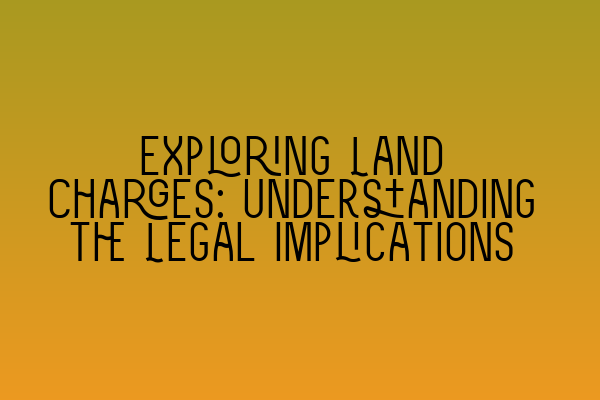Exploring Land Charges: Understanding the Legal Implications
Welcome to the SQE Property Law & Land Law blog! In this post, we will be exploring the intricacies of land charges and shedding light on their legal implications. Understanding land charges is crucial for any solicitor practicing property law, as they can greatly impact property transactions. So, let’s dive right in!
What are Land Charges?
Land charges are legal interests or claims that affect a specific piece of land. They are registered against the title of the property and can significantly impact its sale, lease, or mortgage. The purpose of land charges is to ensure that potential buyers or lenders are aware of any outstanding debts, restrictions, or other legal interests associated with the property.
Types of Land Charges
There are several types of land charges, each with its own legal implications. Let’s explore some of the most common ones:
1. Charges and Mortgages: A charge refers to a legal interest secured against the property, often in the form of a mortgage. A mortgage charge is created when a property owner borrows money from a lender, using the property as collateral. It is essential to be aware of any charges or mortgages registered against the property before entering into a transaction.
2. Restrictive Covenants: Restrictive covenants are obligations that limit the use or development of a property. They can be imposed by previous owners or through planning permissions. It’s crucial to identify any restrictive covenants on the property to ensure compliance and avoid potential legal disputes.
3. Easements: Easements are rights granted to third parties to use or access a property. Common examples of easements include rights of way or rights to access utility services. It is essential to understand the extent and impact of any easements on the property to prevent any future conflicts with the rights of others.
4. Notices: Notices are registered against a property to protect the interests of third parties. Examples of notices include bankruptcy notices, matrimonial home rights notices, and notices of leasehold interests. These notices serve as alerts to potential buyers or lenders about specific legal matters that may affect the property.
Legal Implications of Land Charges
Now that we have explored the different types of land charges, let’s discuss their legal implications. Failing to identify or address land charges adequately can have serious consequences for both buyers and lenders. Some of the potential legal implications include:
1. Financial Liability: Certain land charges, such as mortgages or outstanding debts, create financial liabilities for the property owner. If these charges are not properly addressed, new owners may become responsible for fulfilling these financial obligations.
2. Breach of Contract: Failing to comply with restrictive covenants or other obligations registered as land charges can lead to a breach of contract. This can result in legal disputes and potential damages.
3. Invalidation of Transactions: Land charges can have the power to invalidate transactions. If a property is subject to a charge or notice that has not been properly addressed, the transaction may be deemed void or voidable.
4. Adverse Possession Claims: Land charges can impact adverse possession claims, which involve acquiring ownership of a property through continuous occupation. If there are conflicting interests or rights registered against the property, adverse possession claims may be adversely affected.
Conclusion
Understanding land charges and their legal implications is crucial for any solicitor practicing property law. By being aware of the various types of land charges and their potential consequences, solicitors can ensure the smooth and legal transfer of property ownership. Proper due diligence, including thorough searches and investigations, is essential to identify any land charges and address them appropriately.
At SQE Property Law & Land Law, we offer comprehensive preparation courses for aspiring solicitors, covering all aspects of property law, including land charges. To further enhance your knowledge and preparation for the SQE exam, we recommend checking out our related articles:
– SQE 1 Practice Exam Questions
– SQE 1 Practice Mocks FLK1 FLK2
– SQE 2 Preparation Courses
– SQE 1 Preparation Courses
– SRA SQE Exam Dates
We hope you found this blog post helpful in understanding land charges and their legal implications. If you have any further questions or require legal assistance, do not hesitate to contact us at SQE Property Law & Land Law. Our team of experienced solicitors is here to help you navigate the complexities of property law with confidence.
